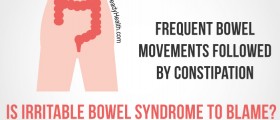Introduction
Down syndrome is a chromosomal condition characterized by the presence of an extra 21st chromosome. This syndrome involves some level of cognitive impairment and impaired physical growth as well. People with Down syndrome have characteristic body and face features and their cognitive abilities often range from mild to moderate disability. However, only a small number of these individuals have severe intellectual disability.
Down syndrome usually implies certain characteristic health concerns. Those include certain heart problems, GERD, sleep apnea, susceptibility to ear infections, thyroid disorders and gastrointestinal problems.

As for the gastrointestinal problems, the most common ones are acid reflux, celiac disease and bowel problems, including constipation.
Down Syndrome and Bowel Problems
Constipation is commonly observed in children with Down syndrome, mostly because of two factors - low muscle tone and reduced motor activity. These factors cause the stool to remain in the colon for longer, the colon absorbs water and the stool becomes hard and difficult to pass.
In children with Down syndrome constipation can become a serious problem because, if chronic, it can lead to anal fissures, impaction or stretching of the rectum.
The treatment for this problem is the same as constipation treatment in everyone else - increasing fiber intake, mostly through fresh fruit and vegetables. Fiber can also be introduced through supplements, such as Metamucil. Stool softeners can be given to constipated babies to ease the passage of stool. Some of the stool softeners include corn syrup, malt barley extract and lactulose, which can also be used by adults.
- Estimates of how commonly these occur have often been derived from selected populations such as those attending special clinics for Down syndrome when about 10% of children and teenagers will be affected.
- Over three quarters of neonates attending clinics may have gastrointestinal problems including feeding difficulties or developmental anomalies.
- However, using a registry of congenital malformations covering an area of France for the years 1979 to 1996 when 398 new cases of Down syndrome were identified, 6% were found to have intestinal atresias. Medical records for all live born children with Down syndrome born between 1973 and 1980 in northern Sweden were analysed and 7.3% were found to have gastrointestinal malformations.
- Structural problems may affect the gastrointestinal tract from the mouth to the anus but many conditions will occur in Down syndrome with similar frequency to other children. However, oesophageal, duodenal, and small bowel atresia or stenosis, annular pancreas causing small bowel obstruction, imperforate anus and Hirschsprung disease may be more common than in the general population.
- Obstruction in the gastrointestinal tract may be detected before birth by imaging techniques and so allow for planned intervention early after birth.
- Adults with Down syndrome are also prone to a wide range of gastrointestinal problems including reflux, obesity, constipation and diarrhoea. Infection with H.pylori appears to be more common but the implications are not clear. Non-immunity to hepatitis A and B can be high and indicates the need for immunisation.
- Coeliac disease (CD) that is associated with Down syndrome can present at any age. Symptoms in children and adults are protean and include growth failure, malaise, vomiting, abdominal distension, diarrhoea and constipation. Unexplained anaemia, iron and calcium deficiency, point to the diagnosis.
- Screening studies have shown a prevalence of CD in Down syndrome of about 5% and because of this strong association some have advocated screening all subjects using human tissue transglutaminase (htTG) and/or endomysial antibodies (EMA) antibodies. Screening should begin at the age of 3 years and be repeated every 2-3 years since a single negative test will not rule out CD for life.
Hirschsprung Disease and Down Syndrome
Children with Down syndrome have an increased risk of a disease called Hirschsprung. In this disease, the part of the colon just before the rectum does not contain nerve endings, which makes it impossible to push to stool through the rectum. The bowel movement occurs only when the stool collects to the point when the back part pushes the front.
The diagnose for Hirschsprung is made through an exam with barium enema and if that exam shows the possibility of Hirschsprung, a rectal biopsy is made. The treatment for this disease consists of surgical removal of the abnormal part of the colon and attachment of good colon to the rectum. This solves the problem of constipation but also often causes problems like chronic diarrhea and malabsorption.
Constipation is also one of the signs of hypothyroidism, another condition commonly seen in children with Down syndrome. It is generally recommended that all persons with Down syndrome have regular blood tests and screenings every couple of years, because other signs of hypothyroidism may be hidden.













-And-Children-16-Warning-Signs-And-Symptoms_f_280x120.jpg)



Your thoughts on this
Loading...